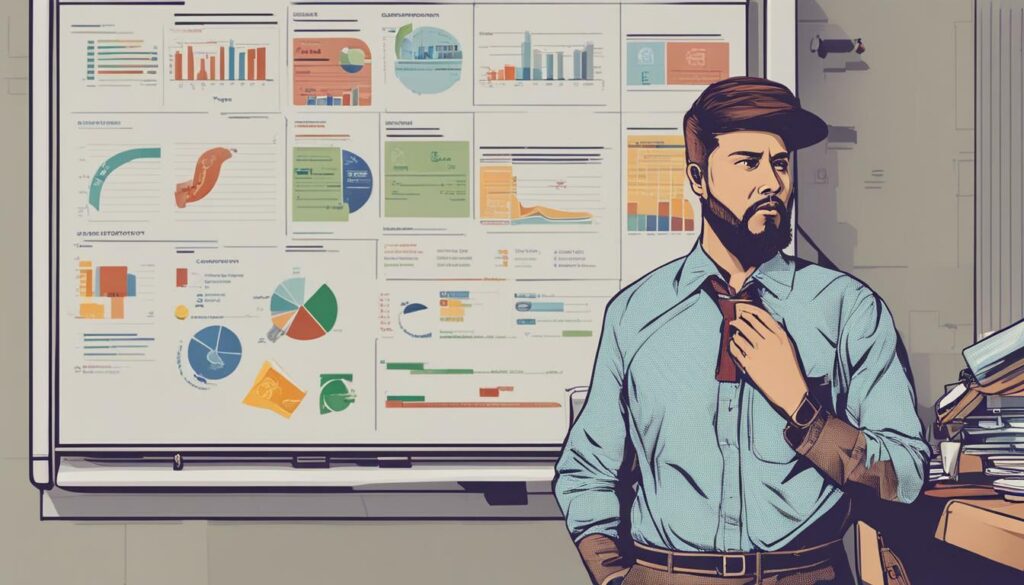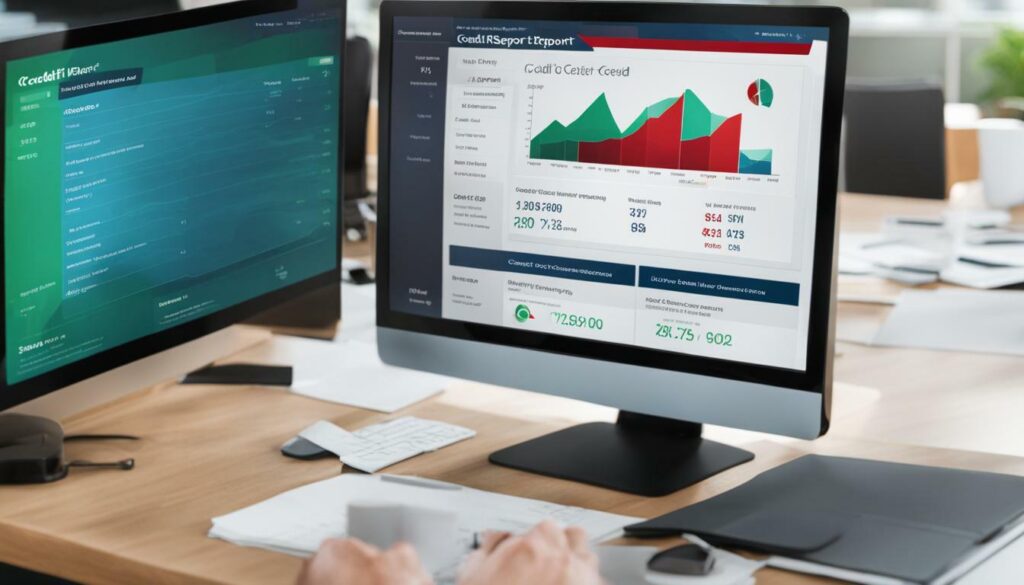Understanding Credit Reporting for the Self-Employed – A Guide

If you’re self-employed, understanding how credit reporting works is crucial to maintaining your financial autonomy and securing your future. While being self-employed doesn’t directly impact your credit score, it can affect your ability to get credit due to the unpredictable income and perceived financial instability. Lenders may view self-employed individuals as riskier, making it more challenging to obtain loans or credit.
To improve your eligibility for credit as a self-employed individual, there are several steps you can take. Start by regularly checking your credit reports and scores to ensure accuracy and identify any areas that need improvement. Approach credit unions, as they may have more favorable lending options for self-employed individuals. Consider offering collateral or saving for a larger down payment to demonstrate your financial stability.
Improving your credit score is also essential. Pay your bills on time, pay down your debts, and keep your existing credit accounts open. Limit applications for new credit, as multiple inquiries can negatively impact your credit score.
Your credit report is a summary of your credit history, including credit accounts, payment history, and other information provided by creditors. It is used by lenders to evaluate your credit risk and calculate your credit scores. Employers and landlords may also refer to credit reports to make important decisions.
🚨 TUIC Errors + Low Credit Score?
CreditScoreIQ helps you build credit faster by reporting utility bills to all 3 bureaus—while you dispute errors.
Start Building Credit Today →Equifax credit reports are one of the major credit reporting agencies and contain various information such as identifying information, credit account details, inquiry history, bankruptcies, unpaid child support and alimony, and collections accounts.
To ensure financial well-being, it is essential to regularly monitor your credit reports and scores for any inaccuracies or fraudulent activities. Free credit reports and scores can be accessed through myEquifax account and AnnualCreditReport.com.
Key Takeaways:
- Being self-employed can make it more challenging to obtain credit due to perceived financial instability.
- Regularly check your credit reports and scores to identify any areas for improvement.
- Consider approaching credit unions for more favorable lending options.
- Improving your credit score involves paying bills on time, paying down debts, and keeping existing credit accounts open.
- Limit applications for new credit to avoid negatively impacting your credit score.
Factors Affecting Credit Reporting for the Self-Employed
When it comes to credit reporting as a self-employed individual, there are various factors to consider that may impact your creditworthiness. As a self-employed individual, your income and financial stability may be viewed as less predictable by lenders, making it harder to secure credit. However, by understanding the factors that affect credit reporting for the self-employed, you can take steps to improve your creditworthiness and increase your chances of obtaining credit when needed.
Available Credit Reporting Options
One factor to consider is the availability of credit reporting options specifically designed for self-employed individuals. While traditional credit reporting agencies cater to a wide range of individuals, there are specialized agencies that focus on credit reporting for the self-employed. These agencies may take into account factors such as business income, expenses, and tax returns when assessing creditworthiness. By utilizing these specialized agencies, self-employed individuals can ensure that their unique financial situations are accurately reflected in their credit reports.
Factors Considered by Lenders
In addition to credit reporting options, lenders also consider other factors when evaluating credit applications from self-employed individuals. These factors may include the length of self-employment, consistency of income, and the presence of other credit accounts and debt obligations. Lenders may also require additional documentation, such as business financial statements or income tax returns, to assess creditworthiness. Being prepared with these documents and being able to demonstrate the stability and reliability of your self-employment income can increase your chances of obtaining credit.
Building a Strong Credit History
Building a strong credit history is essential for all individuals, including the self-employed. By establishing a positive payment history, keeping credit accounts open, and managing debt responsibly, self-employed individuals can improve their creditworthiness over time. It is also important to regularly monitor credit reports for errors or inaccuracies that may negatively impact credit scores. By proactively managing credit and addressing any issues promptly, self-employed individuals can maintain a solid credit profile and increase their chances of obtaining favorable credit terms.
| Key Factors | Impact on Credit Reporting |
|---|---|
| Income stability | Affects lenders’ perception of creditworthiness |
| Length of self-employment | Considered by lenders in assessing credit applications |
| Availability of credit reporting options | Specialized agencies cater to self-employed individuals |
| Payment history and debt management | Crucial for building and maintaining a strong credit profile |
“Being self-employed does not directly affect your credit score, but some lenders may be hesitant to extend credit to self-employed individuals due to the unpredictable income and financial stability.”

By understanding the factors that affect credit reporting for the self-employed and taking proactive steps to manage credit responsibly, self-employed individuals can overcome potential challenges and improve their creditworthiness. By staying informed, utilizing specialized credit reporting options, and focusing on building a strong credit history, self-employed individuals can navigate the credit landscape with confidence and secure the credit they need when they need it.
Building Credit History as a Self-Employed Individual
Establishing a strong credit history is crucial for self-employed individuals looking to secure loans or financial opportunities based on their creditworthiness. However, being self-employed can present unique challenges in building and maintaining a solid credit history. Here are some strategies to help you navigate the process and improve your credit score as a self-employed individual.
1. Pay Bills on Time
One of the most important factors in building credit history is your payment history. Make sure to pay all of your bills on time, including credit card payments, business loans, and personal loans. Late payments can have a negative impact on your credit score and make it harder to obtain credit in the future.
2. Keep Credit Accounts Open
While it may be tempting to close old or unused credit accounts, keeping them open can actually help improve your credit history. Length of credit history is an important factor in calculating credit scores. By keeping your old accounts open, you can demonstrate a longer credit history, which can positively impact your creditworthiness.
3. Limit Applications for New Credit
Every time you apply for new credit, it results in a hard inquiry on your credit report, which can temporarily lower your credit score. As a self-employed individual, it’s important to be selective and only apply for credit when necessary. Too many inquiries within a short period of time can make you appear risky to lenders.
Quote:
“By paying bills on time, keeping credit accounts open, and limiting applications for new credit, self-employed individuals can build a strong credit history and improve their creditworthiness.”
By following these strategies and being proactive in managing your credit, you can gradually build a positive credit history as a self-employed individual. Remember to regularly check your credit reports for accuracy and monitor your credit score to stay on top of your financial health.
| Benefit | Action |
|---|---|
| 1. Pay bills on time | Set up automatic payments or reminders to ensure timely payments. |
| 2. Keep credit accounts open | Avoid closing old accounts unless necessary. |
| 3. Limit new credit applications | Only apply for credit when necessary and avoid multiple inquiries. |

Credit Reporting Services for the Self-Employed
With the help of credit reporting services designed for self-employed individuals, you can stay on top of your credit and monitor any changes or potential concerns. These specialized services cater to the unique needs of self-employed individuals, offering comprehensive credit reporting and monitoring tools to ensure you have a clear understanding of your credit profile.
One such service is Equifax, which provides credit reports that contain a wealth of information, including identifying information, credit account details, inquiry information, bankruptcies, unpaid child support and alimony, and collections accounts. Regularly checking your credit report from Equifax can help you identify any inaccuracies or discrepancies that may impact your creditworthiness. It is important to note that different consumer reporting agencies may have slightly different information, so it’s a good idea to check reports from multiple sources.
Monitoring your credit is essential for self-employed individuals, as your credit history plays a crucial role in securing loans, obtaining favorable interest rates, and even getting approved for rental applications. By subscribing to credit reporting services, you can receive regular updates on your credit score and be alerted to any suspicious activity or potential identity theft. This proactive approach allows you to take immediate action if you notice any inconsistencies or unauthorized access to your credit accounts.
Table: Key Benefits of Credit Reporting Services for the Self-Employed
| Benefits | Description |
|---|---|
| Improved Credit Monitoring | Receive regular updates on your credit score and be alerted to any changes or potential concerns. |
| Early Detection of Fraud | Identify any suspicious activity or potential identity theft, allowing you to take immediate action. |
| Accuracy Check | Regularly review your credit report for any inaccuracies or errors that may impact your creditworthiness. |
| Financial Empowerment | Stay informed and in control of your credit, enabling you to make informed financial decisions. |
By utilizing credit reporting services tailored for self-employed individuals, you can gain valuable insights into your credit profile and proactively manage your financial well-being. With accurate and up-to-date information at your fingertips, you can make informed decisions to improve your creditworthiness and achieve your financial goals.

To maintain good credit standing as a self-employed individual, it’s essential to follow certain guidelines and adopt responsible credit habits. These guidelines will help you establish and maintain a positive credit history, which can increase your chances of securing favorable lending terms and opportunities for your business.
1. Regularly Check Credit Reports and Scores
Monitoring your credit reports and scores is crucial for self-employed individuals. It allows you to identify any errors or inaccuracies that may affect your creditworthiness. Consider using credit monitoring tools or signing up for a service that provides regular updates on your credit status. By staying informed, you can address any issues promptly and maintain control over your financial reputation.
2. Maintain On-Time Payments
Consistently making your bill payments on time is one of the most important factors in maintaining good credit. Late payments can negatively impact your credit history and lower your credit score. Create a system to ensure timely payments, such as setting up automatic bill payments or reminders. Demonstrating responsible payment behavior reinforces your creditworthiness and builds trust with lenders.
3. Manage Debt Wisely
Keep your debt levels manageable by avoiding excessive borrowing. It’s crucial to maintain a healthy balance between the amount of credit you use and your available credit. High credit utilization ratios can signal financial instability to lenders. Aim to keep your credit utilization below 30% of your available credit. Paying down debt regularly and keeping existing credit accounts open can also positively impact your credit score.
Adhering to these guidelines will not only enhance your self-employed creditworthiness but also create a solid foundation for your financial future. Remember, establishing good credit takes time and consistent effort, but the long-term benefits will be worth it.
| Guidelines for Credit Reporting | Benefits |
|---|---|
| Regularly check credit reports and scores | Identify errors and maintain control over your financial reputation |
| Maintain on-time payments | Reinforce creditworthiness and build trust with lenders |
| Manage debt wisely | Maintain a healthy balance and demonstrate financial stability |
Remember: Your credit history as a self-employed individual plays a significant role in your financial well-being. By following these guidelines, you can establish a strong credit foundation, improve your creditworthiness, and seize opportunities for personal and business growth.

Credit reports provide a comprehensive overview of an individual’s credit history, including specific information that can impact the creditworthiness of self-employed individuals. When it comes to self-employment, lenders may scrutinize your credit report with a closer eye due to the nature of your income and financial stability. It’s important to understand what information is included in your credit report and how it can affect your ability to obtain credit.
One key aspect of credit reports for self-employed individuals is the inclusion of unpaid child support and alimony. These obligations can have a significant impact on your creditworthiness and lenders’ perception of your ability to handle financial responsibilities. It’s essential to ensure that any obligations related to child support and alimony are promptly paid to avoid negative marks on your credit report.
Credit reports also highlight collections accounts, which can be detrimental to your credit score. Collections accounts typically arise when you fail to pay a debt, and the creditor hands over the account to a collections agency. These accounts can significantly lower your credit score and make it difficult to obtain credit in the future. It’s crucial to address collections accounts promptly by negotiating payment arrangements or seeking professional assistance when necessary.

Equifax credit reports are one of the key resources for understanding the creditworthiness of self-employed individuals. These reports contain a wealth of information, including identifying details, credit account information, inquiry information, bankruptcies, unpaid child support and alimony, and collections accounts. By reviewing your Equifax credit report regularly, you can stay informed about any potential issues and take proactive steps to improve your creditworthiness.
Remember that credit reports are used not only by lenders but also by employers and landlords to make important decisions. By monitoring your credit report, you can ensure that the information presented is accurate and up-to-date. Inaccurate information can negatively impact your creditworthiness, so it’s essential to address any discrepancies promptly.
Summary
- Credit reports provide an overview of an individual’s credit history, including information that can impact the creditworthiness of self-employed individuals.
- Unpaid child support and alimony, as well as collections accounts, are key factors that lenders consider when evaluating the creditworthiness of self-employed individuals.
- Equifax credit reports contain valuable information, including identifying details, credit account information, inquiry information, bankruptcies, unpaid child support and alimony, and collections accounts.
- Regularly monitoring your credit report and addressing any discrepancies or negative items can help improve your creditworthiness as a self-employed individual.
To obtain a free credit report, you can sign up for a myEquifax account or visit AnnualCreditReport.com. By taking control of your credit report and actively managing your credit history, you can enhance your chances of obtaining credit and securing a bright financial future.
Table: Components of a Credit Report
| Component | Description |
|---|---|
| Identifying Information | Includes your name, address, Social Security number, and other personal details. |
| Credit Account Information | Provides details about your credit accounts, such as balances, payment history, and account status. |
| Inquiry Information | Lists all inquiries made by lenders, employers, or others who have checked your credit report. |
| Bankruptcies | Includes information about any bankruptcies you may have filed. |
| Unpaid Child Support and Alimony | Highlights any outstanding obligations related to child support and alimony. |
| Collections Accounts | Lists accounts that have been handed over to collections agencies due to non-payment. |
Conclusion
By comprehending the nuances of credit reporting for the self-employed, you can proactively safeguard your financial autonomy and make informed decisions regarding your creditworthiness. Being self-employed does not directly impact your credit score, but lenders may perceive self-employment as a higher-risk factor when considering credit applications. It’s essential to take steps to improve your eligibility for loans, such as checking credit reports and scores regularly.
Approaching credit unions, offering collateral, and saving for a larger down payment can also enhance your chances of securing credit. Additionally, focusing on improving credit scores through timely bill payments, reducing debt, maintaining existing credit accounts, and limiting new credit applications is crucial. Remember that your credit report serves as a comprehensive summary of your credit history, including credit accounts, payment history, and other relevant information provided by creditors.
It’s important to note that different consumer reporting agencies may have varying information, so it’s advisable to review your credit reports from multiple agencies to ensure accuracy. Equifax credit reports, for example, contain identifying information, credit account details, inquiry information, bankruptcies, unpaid child support and alimony, as well as collections accounts.
To monitor your credit effectively, it’s recommended to regularly check your credit reports and scores for any discrepancies or signs of fraudulent activity. You can access free credit reports and scores through services like the myEquifax account or AnnualCreditReport.com, which allows you to stay informed about your financial standing and make informed decisions moving forward.
FAQ
Q: Does being self-employed directly affect my credit score?
A: No, being self-employed does not directly affect your credit score. However, it may impact your ability to obtain credit from some lenders due to the unpredictable income and financial stability associated with self-employment.
Q: Will my self-employment history appear on my credit report?
A: Your employment history, including self-employment history, may show up on your credit report based on the information provided when applying for credit. Lenders may use this information to assess your creditworthiness.
Q: How can I improve my eligibility for loans as a self-employed individual?
A: To improve your eligibility for loans when self-employed, it is important to check your credit reports and scores regularly. Other steps include approaching credit unions, offering collateral, saving for a larger down payment, and working to improve your credit scores through responsible financial management.
Q: What is a credit report and how is it used?
A: A credit report is a summary of your credit history, including credit accounts, payment history, and other information provided by creditors. Lenders use credit reports to evaluate credit risk and calculate credit scores. Employers and landlords may also refer to credit reports when making decisions.
Q: What information can be found in an Equifax credit report?
A: Equifax credit reports contain identifying information, credit account details, inquiry information, bankruptcies, unpaid child support and alimony, and collections accounts. It is important to regularly review your credit report to ensure accuracy and monitor your credit health.
Q: How can I access free credit reports and scores?
A: Free credit reports and scores are available through the myEquifax account and AnnualCreditReport.com. It is recommended to check your credit reports and scores periodically to stay informed about your credit standing.
Ready to Improve Your Credit?
Disputing TUIC errors is step one. Step two? Boost your score by reporting utility payments with CreditScoreIQ.
Get Started Now (Only $1 Trial) →3-bureau reporting • $1M identity insurance • Dark web monitoring






